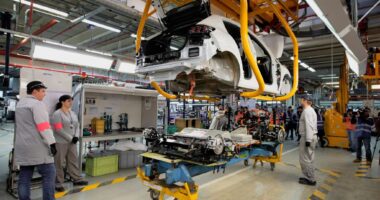Coronavirus and the semiconductor shortage continue to create “immense” challenges for the UK’s automotive industry as output nosedived last month by 41.4%.
It was the fourth consecutive month that the number of vehicles driving off factory floors fell, according to new figures from the Society of Motor Manufacturers and Traders (SMMT).
A total of 64,729 units were built making it the weakest October since 1956, with year-to-date output dropping by 2.9% to 721,505. Such stark news means that it is inevitable people must wait longer before taking delivery of their new car.
The current lead time for a Jaguar I-Pace is 12 months, with some popular Volkswagen models such as the Golf GTI, Touareg SUV and all-electric ID.4 having quoted delivery times that extend into October 2022.
Some companies are understood to be prioritising EVs and hybrids because the more of these that are registered, the less likely it is they will have to pay emissions-based fines.
“These figures are extremely worrying and show how badly the global semiconductor shortage is hitting UK car manufacturers and their suppliers,” said Mike Hawes, the SMMT’s Chief Executive.
“Britain’s automotive sector is resilient but with COVID resurgent across some of our largest markets and global supply chains stretched and even breaking, the immediate challenges in keeping the industry operational are immense.”
However, the growing demand for battery electric, plug-in hybrid and hybrid vehicles saw their share of production volumes for October rise to 30.9%.
So far this year, UK car makers have produced more than 50,000 zero emission vehicles, exceeding the 43,790 total built in the whole of the pre-pandemic 2019, the SMMT said.
Hawes reiterated the need for the government to do more to support the sector to safeguard jobs, help create employment longer-term and ensure the UK remains a competitive player in the global car market.
“Government can help the industry with measures to boost competitiveness in line with global rivals, notably in tackling high energy costs, supporting employment and training, and helping businesses whose cashflow is under pressure from these historically poor production numbers,” he added.









